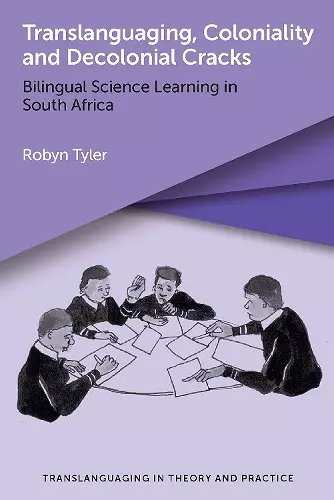Translanguaging, Coloniality and Decolonial Cracks
Bilingual Science Learning in South Africa
Format:Paperback
Publisher:Multilingual Matters
Published:13th Jan '23
Should be back in stock very soon
This paperback is available in another edition too:
- Hardback£114.95(9781800411982)

Unique linguistic ethnography of discourse in science learning
In this ethnography of bilingual science learning, the author connects microanalyses of classroom discourse to broader themes of de/coloniality in education. The author examines the linguistic landscape of the school and the attitudes of staff and students which produce both coloniality and cracks in the edifice of coloniality.
In this linguistic ethnography of bilingual science learning in a South African high school, the author connects microanalyses of classroom discourse to broader themes of de/coloniality in education. The book challenges the deficit narrative often used to characterise the capabilities of linguistically-minoritised youth, and explores the challenges and opportunities associated with leveraging students’ full semiotic repertoires in learning specific concepts. The author examines the linguistic landscape of the school and the beliefs and attitudes of staff and students which produce both coloniality and cracks in the edifice of coloniality. A critical translanguaging lens is applied to analyse multilingual and multimodal aspects of students’ science meaning-making in a traditional classroom and a study group intervention. Finally, the book suggests implications for decolonial pedagogical translanguaging in Southern multilingual classrooms.
Through detailed ethnographic research, this book presents a vision of decolonial learning in South Africa – students drawing on their full semiotic repertoires to make their voices heard, as they shape the future of knowledge creation. It is essential reading for anyone concerned with de/coloniality in education and society. * Adrian Blackledge, University of Stirling, UK *
Robyn Tyler provides a beautifully detailed, as well as theoretically and methodologically innovative, linguistic ethnography of the ‘coloniality of language’ and ‘decolonial cracks’ in high school science learning on the periphery of Cape Town. Making visible the resourceful, multi-semiotic meaning-making of marginalized African language speaking students, the book makes an invaluable contribution to scholarship in critical sociolinguistics and bi/multilingual education from the Global South.
* Carolyn McKinney, University of Cape Town, South Africa *...the book effectively conveys the intricate layers of language-in-education policy and practice in any given schooling context, encompassing the curriculum, school’s physical environment, teacher ideologies, student affect, and more. It implies that a potential remedy toward a future with less colonialty lies in the hands of teachers, students, education leaders, and policy makers.
* Maya Alkateb-Chami Editor, Harvard Educational Review *Anyone who is interested in better understanding the decolonial potential of translanguaging would find this book interesting and helpful. As decoloniality is about thinking “otherwise” to pursue pluriversality (Mignolo, 2000), showcasing what such pursuit can look like is important, and Tyler’s work just does this. In addition, her work offers an example of the very job of noticing, valuing, and building on the emergent decolonial crack that is already in the coloniality.
* Eunjeong Lee, University of Houston, USA, International Journal of Bilingualism 28 (4) *ISBN: 9781800413566
Dimensions: 234mm x 156mm x 10mm
Weight: 262g
184 pages